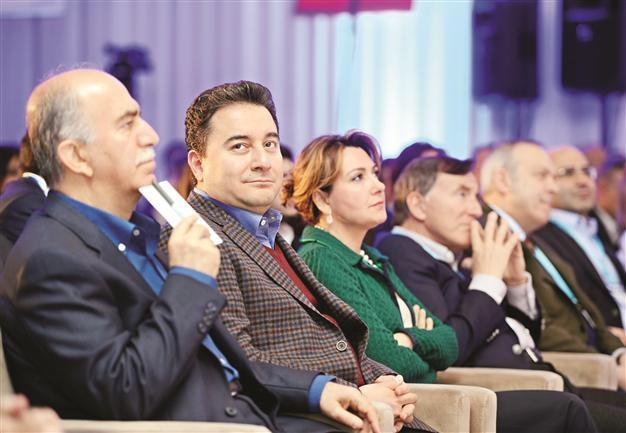Global economy’s axis shifts from West to East: Deputy PM
BURSA – Anatolia News Agency

Deputy PM Ali Babacan (2L) attends an economic forum in Bursa along with Doğan TV Holding head Arzuhan Doğan Yalçındağ (3L) and others. AA photo
The latest economic crisis has shifted the balance of economic strength from the West to the East, Deputy Prime Minister Ali Babacan said yesterday at the second Uludağ Economy Summit taking place between March 29 and 30 in the northwestern province of Bursa.“In the next several decades, Asia and Africa will be highly important regions. Europe, Japan and the U.S. will continue to have an important share in global trade. But, economic strength continues to shift from the West to the East,” Babacan said. The summit, organized by the Governorship of Bursa as well as Capital and Ekonomist magazines, gathers top leaders from private sector companies,
governments, nonprofit organizations and academic institutions to discuss global economic issues.
Arzuhan Doğan Yalçındağ, chairperson of Doğan TV Holding, said as the world’s risk map has been changing, investments are moving to developing countries, adding that it brings new opportunities for Turkey, which is “shining like a star among the world’s economies.”
Yalçındağ stated that while the European Union struggles with the debt issues of its members and the United States’ leadership role in the global economy is been questioned, developing countries show a better economic performance than the developed ones. The investments are shifting to the developing countries that grow very quickly, she added.
Babacan said borders from the Balkans to the Gulf region and from the Gulf region to Algeria and Morocco will begin to lose meaning. “We insist on free trade, which involves visa liberalizations, the free movement of individuals and free movement of products between countries.”
“We want energy and financing to flow easily between countries,” Babacan said. “Such a case would be a ‘win-win’ scenario for all countries.”
‘Turkey rising brand in the world’
Turkey is a rising brand in the world because it has kept its promises, Babacan said, referring to the words of Coca Cola CEO Muhtar Kent, who had said, “A brand is a promise, a good brand is a promise kept.”
“In the last decade, Turkey’s program of reform in its EU process, economic performance through its economic transformation program and fulfillment of its promises have all brought it to a different point,” Babacan said, noting that the golden triangle – the government, business world and non-governmental organizations (NGOs) – has been formed in Turkey but NGOs should be further strengthened.
Babacan also criticized the fact that many countries are attempting an economic recovery through their Central Banks printing of fiat money – which refers to issuing cash without adding gold into the reserves – in order to prevent the bankruptcy of banks and public expenditures that are higher than incomes. “States’ over expenditures or central banks’ money-printing never works out. Citizens hesitate to spend money because of a confidence gap in the countries,” he said.
Banks with little confidence draw liquidity from their Central Banks or deposit there, making the liquidity entering the market thanks to Central Bank printing quickly return to the Central Bank. The eurozone economy of 17 members will shrink again this year as it did last year, Babacan said.
















